- Home
- Elizabeth Hunter
The Secret Page 12
The Secret Read online
Page 12
“Yes.” Barak cocked his head. “He won’t hear me. Whatever magic Jaron has laid over the woman protects me as much as it does her.”
“Kostas is perceptive,” Jaron said, “But he is not more powerful than me.”
“Why do you shield her?” Vasu asked.
“I have my reasons.”
Reasons only Barak knew. And his oldest friend only knew because he’d found Jaron in a killing rage sixty years before. A rage that would have swallowed the world unless Barak intervened.
Jaron had not taken a human lover since, and his line was dying.
He wanted it to.
Vasu, the most terrestrial of them, crouched down, clearly intrigued by the scene that Jaron showed them.
“I have never understood the fear of them.”
“That is because you have never raised your daughters,” Barak said.
Vasu shrugged. “If they run to the humans, the humans may have them.”
“The humans consider them mad.”
“What is madness but a form of wisdom?” Vasu murmured, his eyes still locked on the warehouse. “Once they were called seers. Holy women. They were revered in my territory. But Volund fears them. Hates them. Galal butchers them in the name of progress. Why?”
“They are of us,” Jaron said, “but unlike us.”
Barak said, “When the first Fallen daughters were born, they were killed immediately. Considered defective human offspring.”
“Many still view them as such,” Jaron said.
He remembered when Barak had stopped killing his female children. It was when the first pair of twins had been born. The two children grew to be some of his most powerful, though the daughter was always kept hidden from any he did not trust absolutely. Jaron was the only angel who knew Barak no longer killed or abandoned his daughters. Not that many didn’t escape his control. Those, he left to the human world. Or he had, before betrayal had rent their world. Barak had also ceased siring children sixty years ago, for many of the same reasons Jaron had.
Yet Vasu knew nothing. He still stared at the warehouse, watching the scene as if it were performed on a human stage.
“Vasu,” Jaron said.
Gold eyes looked up. Vasu’s dark skin was colorless in the night, but his gold and black hair whipped in the wind. The gold reflecting the starlight, the black swallowing the darkness.
“What do you want of me?” he asked. “I do not want the same thing you do. I have decided.”
“You will remain here?”
“Yes.”
Barak stepped forward. “Are you certain?”
“Are you?”
Barak’s eyes narrowed. “I am. If you remain, you will be alone.”
“If we succeed, I will not be. There will be no more reason to hide, and my people will return to me.”
Jaron said, “Killing Volund will not erase all your enemies, brother.”
“It will erase enough of them,” Vasu said. “Galal will be nothing without Volund’s support. You have your vengeance, and I have mine.”
“Enough,” Jaron said quietly. “We are decided.”
“We are decided,” the three Fallen said, turning their eyes back to the cold warehouse on the edge of the mountains where the earthly realm had changed in the space of a single word.
Chapter Nine
SISTER.
Malachi’s mind rebelled.
No.
It wasn’t possible.
They would have known.
They had to have known.
How could they not have known?
He reached for Ava’s hand, but she was already walking toward the woman called Kyra. Renata was at her side.
“Ava, don’t!”
The Grigori around them had been calm, almost eerily so. But at his protest, they turned furious eyes toward Malachi, as if they were enraged at the interference. Max put a hand on his arm and he calmed.
“Renata is with her. She’ll be fine. Kostas would never attack Ava, especially not in front of his sister.”
Sister.
A sister.
“How—”
“They are Barak’s children. Twins. Both their sire and mother are dead.” Max lowered his voice. “Malachi, surely you can see.”
He knew Max was telling the truth. It was the eyes. The woman’s gold eyes were exactly like his mate’s. She had luminous skin. Ethereal beauty. She was Grigori in female form.
Not Grigori.
Grigora.
“Max, it’s not…”
“It is.”
“But we would have known,” he said. “There was never any—”
“Why would you have known, Scribe?” Kostas’s eyes pierced him from across the room. “When does your kind stop to ask questions?”
Malachi ignored the Grigori and watched Ava. She was holding Renata’s hand but reaching for Kyra. She looked over her shoulder, searching for him.
“Malachi?”
“I’m here.”
“I…” Ava looked between Malachi and Kyra. Kyra and Kostas. “This is real?” she whispered, her eyes revealing her deepest fear.
He forgot the angry Grigori and walked over to her, bending to whisper in her ear. “This is real, canım. You’re not dreaming. Does this feel like a dream or a vision?”
“No.”
He squeezed her hand. “See?”
“Interesting,” Kostas mused. “I wondered what she could do.”
Malachi’s head whipped around. He left Ava with Renata and Kyra as he stalked toward Kostas. “My mate is none of your concern.”
Kostas looked amused, but Malachi said nothing else. He had no wish to confirm or deny anything about Ava until he knew more about whatever was going on. He glanced over his shoulder, but the women were locked in intense conversation in the corner of the room. The males around them had withdrawn, keeping watch but not interfering.
Malachi drew Max to the side. “How did you discover this?”
“I’ve known Kostas for years,” he said. “We’ve traded information. Favors, at times. I knew there were others like him—Grigori free of their sires—but they’re very secretive.”
“And the women? Why did we never see them? Hundreds of years—thousands! How could a secret like this remain hidden?”
“How do we remain hidden?” Max said. “Human see what they want to see. And sometimes Irin do as well.”
Malachi couldn’t argue with that. He looked at the protective Grigori soldier who stood near them. Watching his sister. Watching them.
The man was different than the others. All these Grigori were. There was none of the desperate hunger he associated with his mortal enemies. The men around him looked like Grigori. Smelled like Grigori. But… they did not act it. And Malachi wondered how it was possible. Was the presence of only one female so powerful to them?
“Your sister.” Malachi walked toward Kostas. “There are others like her?”
“Yes. Though there have never been many,” Kostas said. “If you’re truly interested, I’ll explain, though it probably won’t improve your opinion of our race.”
Malachi asked Max, “Do you trust him?”
“I wouldn’t be here if I didn’t.”
Malachi crossed his arms and stared at Kostas. “Maybe you’re different. But don’t try to tell me most of your kind aren’t murderers and rapists. I’ve witnessed the aftermath of too many attacks.”
“I’d never claim to be anything but what I am,” Kostas said. “But if it helps, the same angels trying to kill you would love to kill me as well.”
“Why?”
“I’m an abomination,” he said with a grim smile. “I should have died years ago when my father was killed, but I didn’t. Volund, especially, hates that I even exist.”
“Volund killed your father?”
Kostas nodded. “He wanted his territory. Barak used to control most of Northern Europe.”
“That’s all Volund’s land now,” Max said. “He was successfu
l.”
“How much do you know about us?” Kostas asked Malachi. “Other than what you’ve learned in your efforts to kill us, what do you know?”
“You have magic, but not like us.”
“True.” Kostas motioned them toward a number of ragged chairs. The Grigori who were sitting there moved away immediately. It was obvious who was in charge. “The average son of the Fallen lives for around one hundred sixty to one hundred eighty years. Nothing close to the Irin lifespan.”
“But there are some who are much older.”
Brage, the Grigori who’d killed Malachi in the cistern—who’d tried to take Ava from him—had been present during the Rending. He’d been at least two hundred and fifty years old.
“Our lives can be prolonged by magic—as the Irin’s can—but only at the will of the Fallen. We exist for them. An angel who finds a particular child useful can extend his life indefinitely.”
“Do they?”
“Rarely.” Kostas leaned forward, his elbows on his knees. “Do you know what the Grigori are, Scribe?”
“You’re sons of the Fallen. Half angel and half—”
“We’re slaves,” Kostas said with a bitter smile. “The Irin forefathers left, giving their children knowledge and freedom. The Fallen stayed and kept their children under their thumbs. We exist to serve them. We have no will other than theirs. No life beyond what they give us. If they call us, we come. If they command us, we obey. To do otherwise is unthinkable. We feed…” Kostas drew in a ragged breath. “We feed on humans because our touch hunger is voracious and most Grigori have no outlet other than the humans we’re presented with when we are mere children. No mothers. No sisters. No mates.”
“So you kill like monsters?” Malachi asked.
“We are never taught to care. We take what we want because we can. Cruelty is rewarded. Mercy or conscience is not.”
“So why should I trust you?” Malachi asked. “How many women have you killed?”
Kostas’s eyes froze. “Too many.”
Malachi leaned forward. “And why should I not execute you here?”
“Because my men surround you,” Kostas said. “They owe me their loyalty. And I cannot allow you to take my protection away from those who need it.”
“How do I even begin to trust you?” Malachi said. “You could lie—”
“I love my sister.” Kostas’s eyes softened as he looked to Kyra. “I have always protected her. Even when my father was alive. I am far from guiltless, but she is the reason I’ve never surrendered to the total rage most Grigori feel. Her touch. Her life. Our father allowed us to stay together because I was useful to him, and I’m stronger with Kyra near me.”
“Barak did not have an overly cruel reputation.”
“Some angels are more lenient than others,” Kostas said, turning back to them. “Some are negligent and don’t care. But all of us exist at the whim of the Fallen. Free will only came to me once my father was dead.”
Malachi checked on Ava again, but his mate was still huddled in the corner with the other two women, speaking in low voices. “Why have we never seen a female of your race before?”
“How do you know you haven’t?” Kostas asked.
Malachi had no answer.
“Kyra and I were fortunate,” he continued. “Barak doesn’t kill his daughters at birth like most of the Fallen do.”
A knot tightened in his gut. “Killed at birth?”
A hollow look came to Kostas’s eyes. “The females have always been harder to control. Most angels consider their daughters too dangerous to live.”
“Why?” Malachi asked.
“Think about it,” Max said. “If we draw the Irin and Grigori parallel out, Grigori would be able to work magic if they could write as we do. If they were taught the spells.”
“But the Fallen do not teach them,” Malachi said, still profoundly grateful for that fact. Kostas the heretic might be controlling himself, but that hadn’t changed his opinion of Grigori as a whole.
“Nor should it,” Kostas said, looking at Malachi.
He tensed, realizing the man had heard his thoughts. “You’re telepathic?”
Kostas shook his head. “Not truly. I hear whispers of thoughts every now and then. Barak’s children sometimes do. If I’d had training from my father, I might know more.”
“They offer you no teaching at all?” Malachi could hardly believe it. Knowledge was revered in Irin culture. Training started before children could speak. It was given in playful verses and songs from the time they were born. The teaching of magic was an Irin parent’s primary responsibility.
“They do not teach us, or they cannot,” Kostas said. “We don’t know. I’m certain they wouldn’t, even if they could. It would make us more powerful. And if we were more powerful—”
“You might be harder to control,” Malachi said. “But why are your sisters considered more dangerous than their brothers?”
“They hear things,” Kostas said, his voice low. “Sometimes they say things. Dangerous things they have no idea how to control. Many are unwell in their minds. Tormented by—”
“Voices,” Malachi said, glancing at Ava. “If they are like our women, they hear the soul voices of humanity.”
“Obviously your women have a way to control it. Ours do not. My sister… I try to keep her as isolated as I can. She wanted to come and meet your mate, though I advised against it.”
“Ava was the same.” Malachi offered that one comfort. “Before we found her. She survived.”
Kostas took a deep breath. “I love my sister. I cannot remember a time when I did not. Even when my father was alive. Barak was… negligent. He didn’t kill his daughters, but they were sent away. He had places that were mostly prisons. Those who escaped were left alone, but then they were at the mercy of the humans. Yet his negligence was still better than most of the Fallen. Many infant daughters, even if they aren’t killed, die of neglect when their mothers give birth to male children.”
“Why?”
“Because we kill our mothers,” Kostas said. “Simply by existing.”
Malachi tasted acid at the back of his throat.
“Don’t you understand?” Kostas continued. “Your ancestors were forgiven because they recognized the truth: Angels don’t belong here. Their children—all of us—never should have existed. We are abominations. They left because they knew that, so the Creator had mercy on the Irin. My people?” Kostas leaned back. “We received no mercy. We don’t deserve it. We’re all murderers before we can speak.”
The man’s self-loathing was so evident Malachi had a difficult time condemning him further.
Max leaned forward and said, “You fight to make things better, my friend.”
Kostas gave him a rueful smile. “I would call you my friend, Maxim, but for your willful ignorance of the truth.”
“It’s not ignorance. I simply don’t judge you as harshly as you judge yourself.”
“I saved Kyra,” Kostas said to Malachi. “I have been able to save a few others. I protect them. That is my penance for the lives I’ve taken. The harm I’ve done.”
“How many women?” Malachi asked. “How many do you protect?”
“I don’t trust you that much, Scribe. No matter who you are mated to.”
“When I finally discovered it,” Max said, “I knew I had to tell you. For Ava.”
Malachi narrowed his eyes at Max. “You think Ava is Grigori?”
“No. Yes?” Max said. “I don’t know. I see more in common than different.”
Malachi’s eyes turned to Ava and Kyra. He could see it, see the similarities, but he could also see profound differences. Ava didn’t look inhuman, as Kyra did. Her skin wasn’t as pale or as luminous. Her eyes were the same, but she was no ethereal creature. His mate had a delicate, yet earthy, beauty.
“I don’t think she is, Max.”
“There’s something…,” Kostas said. “Her eyes drew me at first. But I agree. Your mat
e does not look like our women.”
“She’s at least half human. Her mother is fully human, but her father is not. That may be the connection.”
“Is her father Grigori?” Kostas asked. “Some of us are able to father children with human women. Some have enough control.”
“He doesn’t smell it. Or look it. Though there is something different about him.”
“Reed’s mother,” Max said. “That has to be the connection. Ava’s grandmother must have Grigori blood.”
Malachi said, “We’ve been trying to find her, but we haven’t had much success. Could she be one of yours?”
Kostas took a deep breath and frowned. “If she is, I’d have no way of knowing without meeting her. No records are kept in our world, particularly for females. The ones who survive are mostly in the human population because they’re safer there.”
“Safer?” Malachi asked. “Among humans who think they’re insane?”
“They can’t hurt humans as the males do, so they can often blend in. It’s better than what faces them among the Fallen.”
“Do you have any idea how many might be out there?” Malachi asked. “How many… Grigora?”
“The Fallen call them Grigora. They call themselves kareshta. The silent ones.”
“Silent ones?”
“Those who make it through childhood learn to be silent. Not to use their voices. It’s their only chance of surviving in our world.”
Kareshta.
Kostas continued, “I would estimate only two—maybe three births in ten are female. The Fallen tend to create male children. Some have no daughters at all. Whatever genetics are in play, women are rare.”
“Only four in ten Irin children are female,” Max said. “We have no idea why. It’s always been that way.”
Kostas said, “Of that twenty percent, more than half are probably killed at birth. There could be hundreds. Thousands, counting all the minor angels. We have no way of knowing. Most of them are in the human world. Free Grigori like us who shelter the kareshta will only shelter those whose fathers are dead.”
“What?” Malachi asked. “Why?”
“Security,” Kostas said with a grimace. “If our sires are alive, they can find us. It doesn’t matter where we go. Only those whose sires are confirmed dead are allowed. Almost all the women I shelter are my sisters. I cannot risk them. Too many of the Fallen are trying to kill me.”

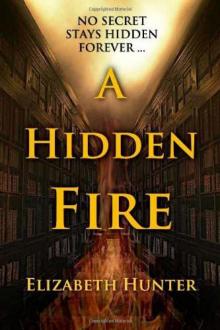 A Hidden Fire
A Hidden Fire The Silent
The Silent The Secret
The Secret A Ghost in the Glamour: A Linx & Bogie Story
A Ghost in the Glamour: A Linx & Bogie Story Waking Hearts
Waking Hearts The Scribe
The Scribe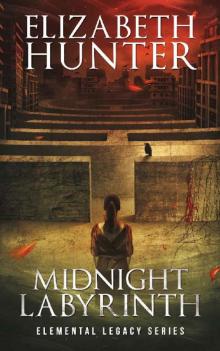 Midnight Labyrinth
Midnight Labyrinth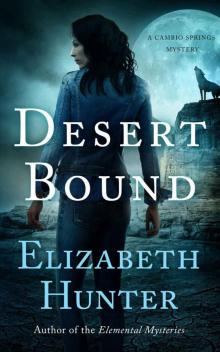 Desert Bound
Desert Bound Five Mornings
Five Mornings The Bonds of Matrimony
The Bonds of Matrimony The Force of Wind
The Force of Wind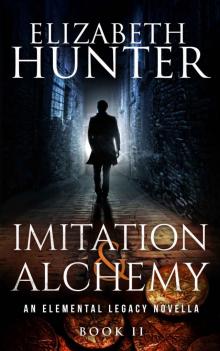 Imitation and Alchemy
Imitation and Alchemy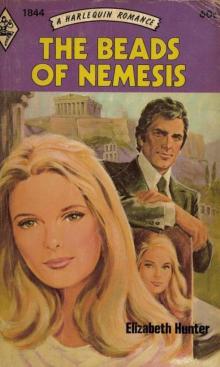 The Beads of Nemesis
The Beads of Nemesis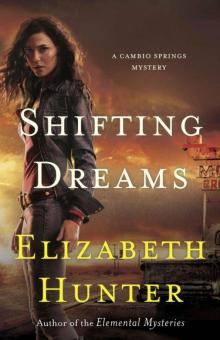 Shifting Dreams
Shifting Dreams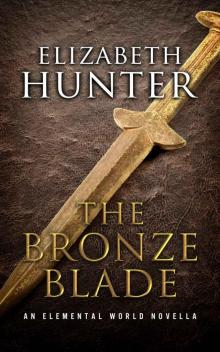 The Bronze Blade
The Bronze Blade Hooked
Hooked The Storm
The Storm The Scarlet Deep
The Scarlet Deep Long Ride Home
Long Ride Home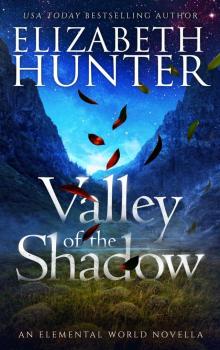 Valley of the Shadow: An Elemental World Novella
Valley of the Shadow: An Elemental World Novella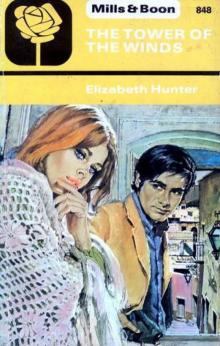 The Tower of the Winds
The Tower of the Winds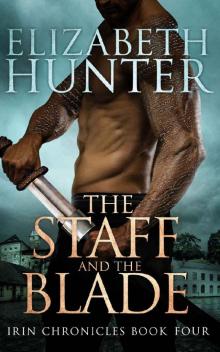 The Staff and the Blade
The Staff and the Blade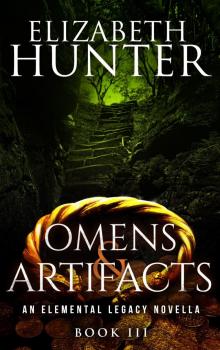 Omens and Artifacts
Omens and Artifacts The Devil and the Dancer
The Devil and the Dancer The Seeker
The Seeker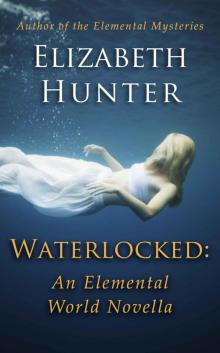 Waterlocked
Waterlocked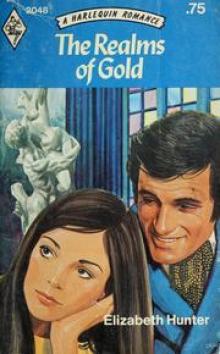 The Realms of Gold
The Realms of Gold A Bogie in the Boat
A Bogie in the Boat Night's Reckoning
Night's Reckoning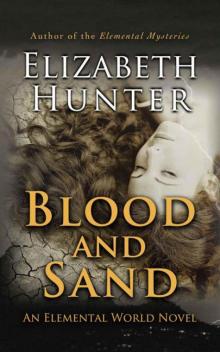 Blood and Sand
Blood and Sand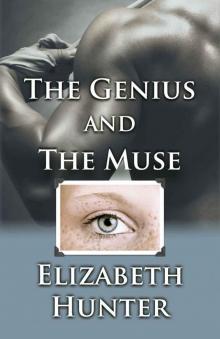 The Genius and the Muse
The Genius and the Muse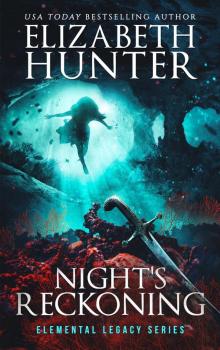 Night’s Reckoning: An Elemental Legacy Novel
Night’s Reckoning: An Elemental Legacy Novel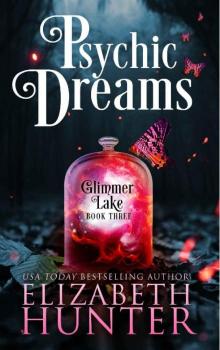 Psychic Dreams: A Paranormal Women's Fiction Novel (Glimmer Lake Book 3)
Psychic Dreams: A Paranormal Women's Fiction Novel (Glimmer Lake Book 3)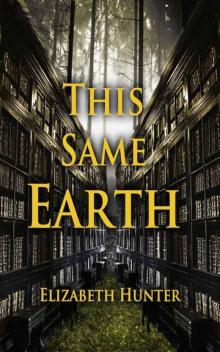 This Same Earth
This Same Earth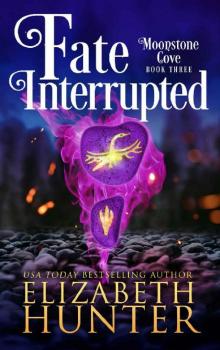 Fate Interrupted: A Paranormal Women's Fiction Novel (Moonstone Cove Book 3)
Fate Interrupted: A Paranormal Women's Fiction Novel (Moonstone Cove Book 3)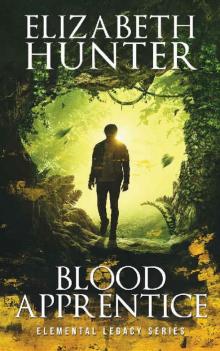 Blood Apprentice: An Elemental Legacy Novel
Blood Apprentice: An Elemental Legacy Novel Valley of the Shadow
Valley of the Shadow The Devil and the Dancer: An Elemental Legacy Novella
The Devil and the Dancer: An Elemental Legacy Novella The Stars Afire: An Elemental Mysteries Anthology
The Stars Afire: An Elemental Mysteries Anthology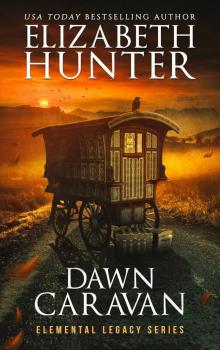 Dawn Caravan
Dawn Caravan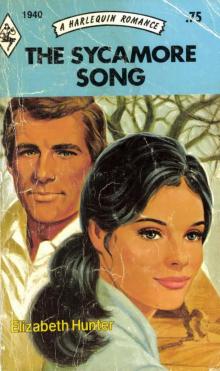 The Sycamore Song
The Sycamore Song The Singer
The Singer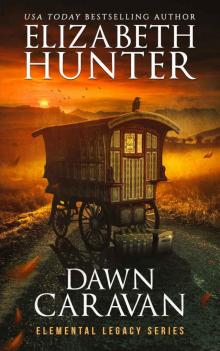 Dawn Caravan: Elemental Legacy Book Four (Elemental Legacy Novels 4)
Dawn Caravan: Elemental Legacy Book Four (Elemental Legacy Novels 4)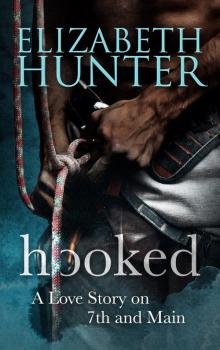 Hooked: A Love Story on 7th and Main
Hooked: A Love Story on 7th and Main A Ghost in the Glamour
A Ghost in the Glamour Grit: A Love Story on 7th and Main
Grit: A Love Story on 7th and Main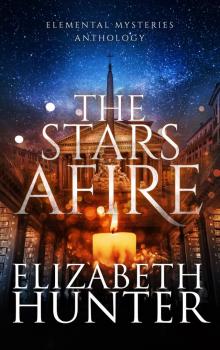 The Stars Afire
The Stars Afire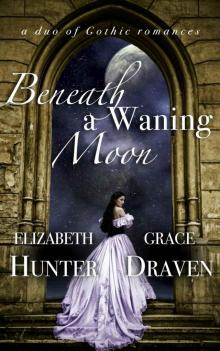 Beneath a Waning Moon: A Duo of Gothic Romances
Beneath a Waning Moon: A Duo of Gothic Romances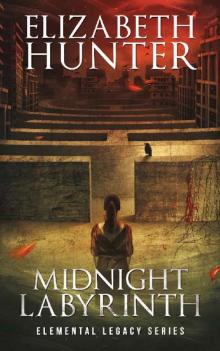 Midnight Labyrinth: An Elemental Legacy Novel
Midnight Labyrinth: An Elemental Legacy Novel All the Stars Look Down: A Duo of Christmas Romances
All the Stars Look Down: A Duo of Christmas Romances The Scribe ic-1
The Scribe ic-1 INK
INK